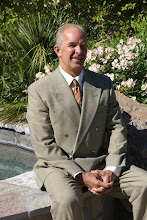I will start by saying that much of what I have learned has come from the scriptures, the word of God. I have been reading them regularly since I was about eighteen - some forty years now! I have also made a practice of pondering the meaning of passages that have stood out. In those forty years I have learned much, and I am grateful beyond words for the truths that I have discovered. While I have learned much from other sources as well, I have always sought to corroborate those truths with the scriptures. To this point, I don't know that I have ever failed in my effort to do so! Once more, I am extremely grateful for this "second witness." The third and final witness, would be that of the "spirit of truth," the Holy Ghost. "By the power of the Holy Ghost [we] may know the truth of all things" (Moroni 10:5).
One final point before sharing my latest insights: I have also come to understand that the hidden meanings of many verses (of scripture) are only discovered or understood in the light of complimentary passages.
Here now is a passage with which many of my readers will be very familiar:
45 . . . and let virtue garnish thy thoughts unceasingly; then
shall thy confidence wax strong in the presence of God; and
the doctrine of the priesthood shall distill upon thy soul as the
dews from heaven.
46 The Holy Ghost shall be thy constant companion, and thy
scepter an unchanging scepter of righteousness and truth;
and thy dominion shall be an everlasting dominion, and with-
out compulsory means it shall flow unto thee forever and ever.
D&C 121
I suspect that most in reading this have concluded that the "everlasting dominion" is something that would be attained in the next life. I always had. Now, however, I'm not so sure. Let's examine another passage with which all readers of the Bible will be familiar.
28 And why take ye thought for raiment? Consider the lilies
of the field, how they grow; they toil not, neither do they spin:
29 And yet I say unto you, That even Solomon in all his glory
was not arrayed like one of these.
30 Wherefore, if God so clothe the grass of the field, which to-
day is, and to morrow is cast into the oven, shall he not much
more clothe you, O ye of little faith?
31 Therefore take no thought, saying, What shall we eat? or,
What shall we drink? or, Wherewithal shall we be clothed?
32 (For after all these things do the Gentiles seek:) for your
heavenly Father knoweth that ye have need of all these things.
33 But seek ye first the kingdom of God, and his righteousness;
and all these things shall be added unto you.
34 Take therefore no thought for the morrow: for the morrow
shall take thought for the things of itself. Sufficient unto the
day is the evil thereof.
Matthew 6
I had always understood that these passages from the Sermon on the Mount were intended for the Lord's chosen apostles only. They were to dedicate their lives to the work of the kingdom, and so the Lord would take care of them, as it were. I'm not sure where this interpretation came from, as the counsel is given in the middle of the sermon, with no indication that it is for only a select few.
In linking the two passages (D&C 121: 45-46 and Matthew 6:28-34) I see a different picture. If each of us is seeking "first the kingdom of God, and his righteousness," then we shouldn't have to worry about ("take thought for") "the morrow," for our "heavenly Father knoweth that [we] have need of all these things."
And what light does section 121 shed on the matter? If we "let virtue garnish [our] thoughts unceasingly; then shall [our] confidence wax strong in the presence of God . . . . and [our] dominion shall be an everlasting dominion, and without compulsory means it shall flow unto [us] forever and ever." In other words, all of our needs will be met. We will have to "take thought" for them, I believe, but we won't have to worry about them!
The keys are to "seek . . . first the kingdom of God, and his righteousness" and "let virtue garnish [our] thoughts unceasingly; then shall [our] confidence wax strong in the presence of God" and "shall he not [then] . . . clothe [us]," unlike those "of little faith?" I think yes!
And what of our title: "More on Deciding"? Well, we must decide that we will "seek first the kingdom of God, and his righteousness," and be "anxiously engaged" in a work that could qualify as such; and we must decide that we believe his promise to take care of us. In other words, we must exercise faith; and that means putting it to work, and probably in areas where it has not been working before!
I believe that the work I am doing qualifies as seeking "the kingdom of God," and that his promise that "all these things [our wants and needs] shall be added unto [us]," along with that of "an everlasting dominion" which "without compulsory means . . . shall flow unto [us] forever and ever" is sure. I have decided what I will do; and I have decided to trust in the Lord's promises!
He has further promised (to those who pay "tithes and offerings") that he will "open [us] the windows of heaven, and pour [us] out a blessing, that there shall not be room enough to receive it" (Malachi 3:10). Couple that with the foregoing promises, and I think He's got us covered!
How much more clear could he make it?

No comments:
Post a Comment